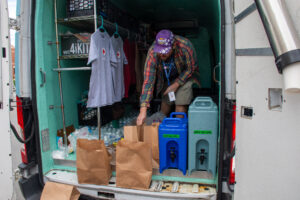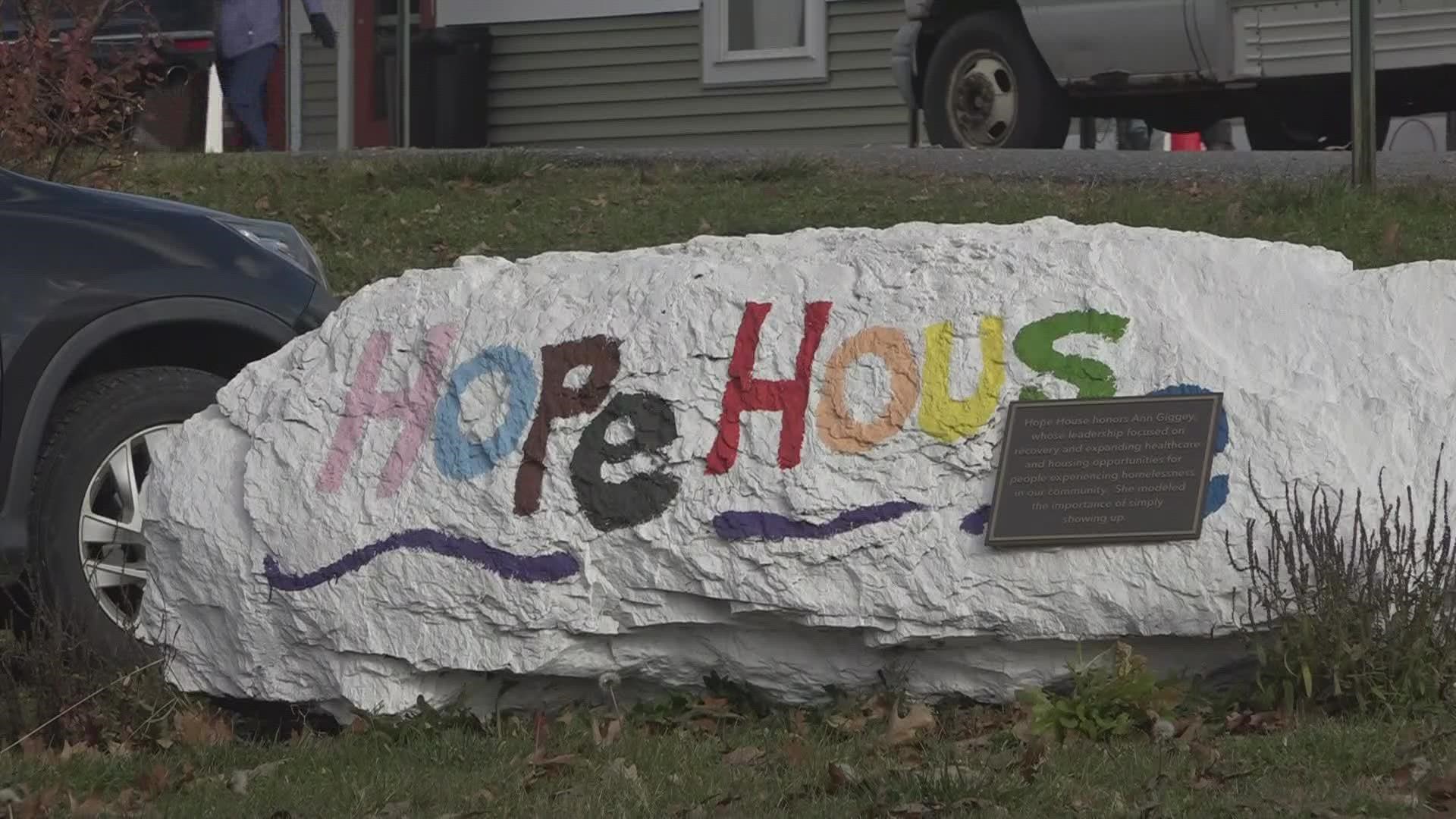Hope House is Bangor’s largest shelter and Maine’s only low-barrier shelter north of Waterville.
Bangor, ME (November 12, 2024) — The Hope House Emergency Shelter is a low-barrier 56-bed emergency shelter in Bangor. Penobscot Community Health Center (PCHC) announced in fall 2023 that due to financial considerations it would close Hope House in fall 2024 unless another provider could take over operations. After thoroughly assessing the potential impacts and thanks to investment from the state to directly support low-barrier emergency shelters for the next three years, Preble Street officially announces today, November 12, that it will take over operations of Hope House to prevent its closure. Preble Street will assume responsibility for the Hope House Shelter in February 2025.
Hope House is one of only five privately-operated adult low-barrier shelters in the state of Maine and the only one north of Waterville. “The loss of Hope House would’ve been felt statewide,” says Mark Swann, Preble Street Executive Director. “When Preble Street was approached to take over shelter operations, we knew immediately that we wanted to support the people whose safety would be most impacted by this loss of shelter. But, as an agency that so many Mainers rely on, we had to do our due diligence on how adding this 24/7, 365 day a year program could potentially impact our existing work to end hunger, homelessness, and poverty.”
“Thanks to the support from Governor Mills and the Maine Legislature, low-barrier shelters will receive funding over the next three years to support their services. This funding allows Preble Street to feel able to take on this responsibility, in support of the city of Bangor, Bangor’s healthcare and social service agencies, and the vulnerable Mainers in need of shelter. We will continue to fill in the budget gaps with the private support from community members and other funders that help us keep the doors open,” added Swann. “However, Maine needs to continue to prioritize sustainable, permanent funding revenue for our critically important low-barrier shelters to ensure that funding challenges do not impact the operations of Hope House – or any other Maine shelter – in the near future.”
“PCHC is deeply grateful for the prioritization by our local and state officials of this much-needed funding for low barrier shelters,” said Lori Dwyer, President & CEO of PCHC. “The funding makes this partnership with Preble Street possible and ensures the Hope House shelter will remain open,” Dwyer further notes.
“This is certainly a win for the health and wellbeing of those who seek shelter services at the Hope House, and for our community. PCHC is optimistic about the benefits that will be brought to our community through its partnership with Preble Street, a strong social service agency with a long history of serving the most vulnerable,” said Dwyer.
With Preble Street bringing its expertise to shelter operations, PCHC can focus on improving access to healthcare through its onsite clinic, which provides same day acute care, primary care, outreach medicine, substance use disorder treatment and mental health care.
PCHC will also continue operating the 48 transitional housing units located in the same building as the shelter and clinic.
Hope House is a professional low-barrier shelter with a long history of innovation and commitment to the community. Hope House is the only shelter option for individuals experiencing homelessness in the Bangor area struggling with substance use disorder and/or complex mental health challenges. Last year, Hope House served more than 300 people, with more than a third entering the shelter from a place not meant for human habitation.
Preble Street takes over the operations of Hope House while recognizing that low-barrier shelters in Maine face a growing yearly budget deficit. Serving as the ‘emergency room’ in the shelter-to-housing continuum, low-barrier shelters are directly on the frontlines of Maine’s opioid crisis. On April 22, 2024, Governor Janet Mills signed the supplemental budget into law, which included three years of $2.5M in annual funding — a total of $7.5M — to directly support low-barrier emergency shelters. This funding will help to address the funding gaps for Hope House over this time period, ensuring that this shelter will remain open and staffed for Mainers.
About Preble Street
Preble Street is a nonprofit social service agency serving the most vulnerable people in Maine since 1975 through innovative, best-practice, client-centered programs. In addition to the largest direct service emergency food program in northern New England, Preble Street operates low-barrier programs throughout Maine providing 24/365 services for individuals and families, including homeless youth, women, Veterans, and survivors of human trafficking, driven by its mission to meet urgent needs, empower people to move beyond the crises in their lives, and advocate for solutions to homelessness, hunger, and poverty. PrebleStreet.org
About Penobscot Community Health Care
Penobscot Community Health Care (PCHC) is a non-profit, Federally Qualified Health Center (FQHC) founded in 1997 to ensure access to comprehensive, integrated primary health care services for all to improve the health and wellbeing of patients and the Maine communities served. PCHC’s twenty-two clinical sites in Bangor, Belfast and Jackman, offer a wide range of services including family medicine, dental, pediatrics, geriatrics, mental health and substance use disorder treatment, specialty services, pharmacy and healthcare for the homeless. Online at www.pchc.com.
Read more

Social work is heart work
This year, the National Association of Social Workers’ Maine Chapter named Preble Street the 2024 Social Work Agency of the Year. Preble Street’s Vice President of Social Work, Andrew Bove, accepted the award on behalf of the agency. Below are the remarks he gave in his acceptance speech. My name is Andrew Bove, and I

Two years of impact at the Elena’s Way Wellness Shelter
October 2024 marks two years of service to vulnerable community members experiencing unsheltered homelessness at the Elena’s Way Wellness Shelter. Since opening its doors, Elena’s Way has provided over 18,000 bed nights to individuals experiencing homelessness. That represents more than 18,000 times that a person has been able to sleep inside a warm, safe, and dignified shelter environment instead of

Understanding low barrier shelters
What does a low-barrier shelter look like? At a time when unsheltered homelessness is increasing exponentially in our community and the shortage of low-barrier shelter beds has created a state-wide homelessness crisis, Elena’s Way and Florence House are a model for how we can take care of the most vulnerable people in our community. The

